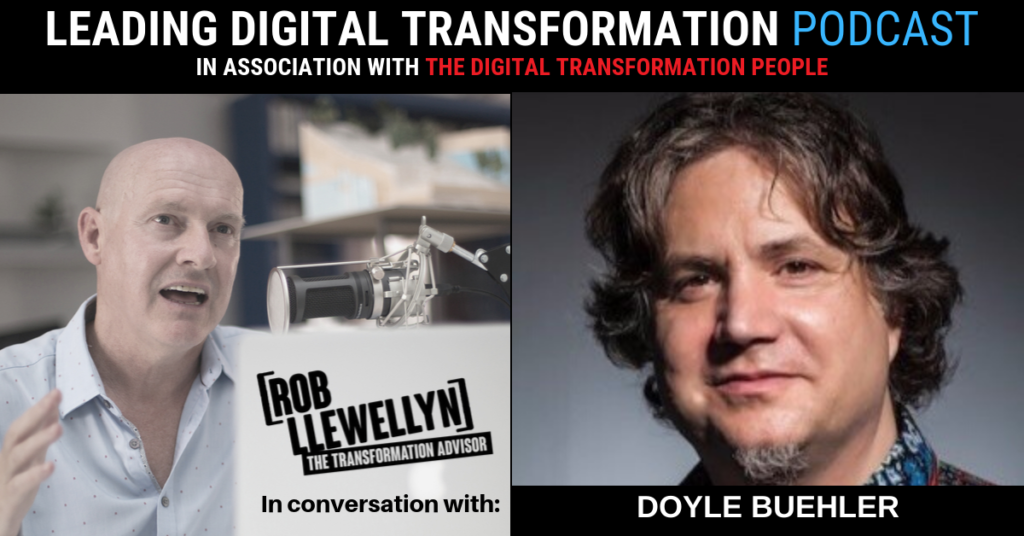‘Leading Digital Transformation’ is a weekly podcast series produced in collaboration between The Digital Transformation People and Rob Llewellyn digital transformation advisor and founder of CXO Transform.
During this series, Rob interviews experienced practitioners, authors and thought leaders whose stories and experiences provide valuable insights for digital transformation success.

In this episode, Rob speaks with Doyle Buehler. Doyle is a Digital Strategy advisor and author of Breakthrough – Unleash Your Remarkable Brand Value, Influence & Authority in which he shares how leaders can achieve more clarity of thinking and strategic focus as they transform their businesses to thrive in the new digital era.
“The first level of a digital strategy is just understanding your “why”, like your purpose, what are you really doing in this space and why are you doing it?”
Listen here and read the full transcript below.
Rob Llewellyn [00:00:25] Hi, it’s Rob Llewellyn here and welcome to another episode of Leading Digital Transformation. Today I’m going to be talking with Doyle Buehler. He’s the CEO of Department Digital. He’s a best-selling author, speaker and digital business thought-leader, who specialises in strategic digital marketing and digital business transformation. Now, at the intersection of innovation and digital strategy, he is best known for effectively connecting business leaders and their prime business to their entire digital ecosystem, to help them build a remarkable, profitable digital business and future-proof and leverage the digital assets with their unique audience. He also hosts the popular podcast “Breaking Digital” and I’ll include a link to that in the show notes, and that’s where he interviews digital influencers from around the world discussing digital leadership, innovation and disruption across a range of digital business and online channel topics. Now without further ado, let’s jump into the interview with Doyle. Doyle, welcome.
Doyle Buehler [00:01:34] Thank you, Rob. How are you?
Rob Llewellyn [00:01:37] I’m very good thanks. Listen, Doyle, I’ve got a lot I want to ask you today, but first of all, I understand that you’ve published a book called “Unleash your Remarkable Brand Value Influence on Authority”. Tell us (without spoiling what are you’re going to tell us about later on) about the book and why you wrote it, Doyle.
Doyle Buehler [00:01:56] Well it’s actually-, I guess it goes back quite a number of years, but it’s actually called “Breakthrough” and then the subtitle is “Unleash your Remarkable Brand Value Influence on Authority”, but that’s sort of where we started. And it comes from my experiences developing a business, a start-up e-commerce business out of Canada. And we spent like honestly a tremendous amount of money; it was the start-ups we were you know financed privately and that sort of thing. And we spent about 300 grand on this website to build this fantastic Digital Design Studio, similar to what you might find in Canada today. But this was back in 2004/2005 and it was really interesting, because we had sort of the technical side of it was like just absolutely amazing, we can print anywhere around the world, we could create these products, we could design, our customers could design them with any number of pictures and images and graphics and that sort of thing. Just fantastic, it was a great technical solution, but it wasn’t a business solution. And there was “how do we actually convert that technical side of things with the business side?”. Right. So how do we actually build a business based upon that? That was obviously the trials and tribulations of a business type of thing, but that was sort of the main driving force. And then as I got more into digital, it was deciding “OK, well how can we actually use strategies that work for businesses?”, because there’s a lot of misinformation, there’s a lot of clutter, there’s a lot of stuff that just doesn’t make sense and businesses really feel quite overwhelmed a lot. And so, I just really want to simplify and say “OK, what process can we use?” I mean, part of my background is actually engineering and a former military pilot as well, so you’re very process-orientated, so I wanted to see how could we actually make and build a process within the whole digital industry type thing and making sure that we could use it to grow business as well.
Rob Llewellyn [00:03:52] You touched on strategy then, why is digital strategy important for transformation?
Doyle Buehler [00:03:58] Well, otherwise if you don’t have a clear digital strategy, you’re actually almost shooting yourself in the foot, because you’ll kind of wander a little bit and you’re flying by the seat of the pants, as the expression goes. But without a real strategy, you have no idea to be able to understand what’s coming and how you’re going to deal with it. And it’s not really related to, you know, if Facebook stops publishing your articles or stuff like that, as digital strategy is really more profound than that, it’s more of a foundation as to say “this is what our business is about” and “this is how we leverage the digital technologies” and “this is how we leverage humans within that digital technology”. So, for transformation, if you really want to succeed at transformation, you need to have a core digital strategy, a core digital foundation that actually carries that through. Otherwise, you’ll be wandering for quite some time. I don’t know if, – there is a quick little story, I don’t know if you have time for it, but is it OK or –
Rob Llewellyn [00:04:56] Absolutely. Go ahead.
Doyle Buehler [00:04:58] Yeah. Well, one of the things is, in relation to strategy and transformation, a thing that piece that comes up quite a lot is finding that direction and making sure that it synchronises with the technology and the human side as well. One of the rules of thumb that we had in flying was basically for every 60 miles that you move forward, if you’re one degree off course, you’ll actually be a mile off your target. So, if you imagine going forward 60 miles, you’re one degree off, you’re one mile off your target to the side kind of thing. And when you think about it, like one degree, it’s not a lot, right? But there is a huge difference here between degrees and percentages. In this case, I’m talking specifically degrees, right? So anyway, if you travel between short distances, Perth to Margaret River or wherever the case may be, Barcelona to London, it’s not that far, so you might be a little bit off course. But if you’re going on a long journey like across Australia, across the United States, across Canada, that degree of error is actually very significant over time, so big that in effect you really won’t get to your destination. So, having a digital strategy really keeps you within that 1 degree, so it allows you to correct, it allows you to see what’s working, what’s not. It allows you to build that foundation that’s so important for any transformation project and to grow the business as well.
Rob Llewellyn [00:06:22] I love the analogy of being off course there, Doyle. You know, you’ve mentioned digital strategy is important, but of course, the 64-million-dollar question is: “how do you build one and what’s important?”
Doyle Buehler [00:06:35] Well, the way that I created one is looking at the process and the frameworks that kind of tie everything together and what are the sort of the key elements needed. But fundamentally, there are multiple levels here, basically. But the first level of a digital strategy is just understanding your “why”, like your purpose, “what are you really doing in this space” and “why are you doing it”, that sort of thing. And it really comes down fundamentally to just understanding “what is your business about”. So, whether it’s about entertainment, instant gratification, personalisation or whatever the case may be, you have to really define that in a sense that makes sense for you, as well as your audience as well. And in terms of sort of putting all the digital elements as well so digital strategy is obviously the starting point. But some of the other points that are supercritical as well to defining your process and defining your digital strategy is actually looking at what I call the breakthrough framework, right, which is seven steps. So, the first one is developing your digital strategy. The second one is developing your content, having a clear content plan. The third one is developing your social and selling and sharing. The fourth one is developing your branding, your videos, your visuals, that sort of thing. Fifth one is developing what I call ‘website alignment’, making sure that your web corresponds to your strategy. The sixth one is developing campaigns and an actual selling process. A lot of businesses to this day don’t even have a selling process. And then the last one that kind of ties it all together is making sure that you’re using the advertising and analytics and dashboards to be able to sustain and grow the business as well. So, when you put all these pieces together, that’s sort of what you can present as your digital strategy. That’s what you can present as sort of your digital workflow for transformation projects, because it gives you something to measure yourself against, you can actually see where you are along those course steps.
Rob Llewellyn [00:08:40] Doyle, you mentioned a number of pieces there which are important. When you go in and out of organisations, what’s your observation of the things that are missing in businesses when it comes to growth and transformation?
Doyle Buehler [00:08:57] Well, number one is they don’t have a strategy. They haven’t defined that “why”, they haven’t defined what it is that they’re trying to do, what value are they going to deliver to their customer. And one of the other important things that makes it sort of a long-term game or long-term business is delivering that value over time. It’s going to change over time. Your value that you deliver now is not the same as the value you’re going to deliver tomorrow or next year. And so, a foundational strategy really takes that into account. So, when you’re doing a transformation project, you’re actually able to navigate that. And again, that comes down to that one degree that I spoke of earlier. It gives you the framework, it gives you the box to work within. So honestly, that’s the biggest mistake I see is that businesses haven’t planned this, so they haven’t sat down and do a little insight into the business and ask some pretty deep questions about the business and the value and the time. And then that becomes your foundation and then you can actually grow from that. The second thing that businesses are missing: they don’t have a very clear and defined sales process. They just kind of expect the customer to buy from them and whether it’s retail or business to business or whatever the case may be, it’s pretty much the same. The structure (and you can see that in the structure of most digital platforms, most web sites, other than obviously if you’re e-commerce player, then they kind of have that set up) but a lot of sort of the more the less product type focus businesses really kind of miss that whole sales process, which means they’re missing out on customers.
Rob Llewellyn [00:10:34] So, you mentioned something really important there that sales process, Doyle, and it’s not for these large established organisations. They’re not used to having that, so to undergo transformation and introduce that kind of process into their business, you know, that’s a big shift for them. And for a lot of people working in the organisation, it’s something very new and a lot of people will have doubts about doing that, about changing the ways that they’ve been working, so how do you go about earning the trust of the workforce and the executives and all of the people that will play a role in that transformational shift?
Doyle Buehler [00:11:14] I think that that’s you know a very deep question and a lot of businesses come up against that and go: “well, how do we actually do that?” And there is obviously a lot to be said about change management really. Fundamentally, a transformational project is a change management project, because you’re dealing with operations, you’re dealing with sales, you’re dealing with marketing, you’re dealing with human resources and that sort of thing. So, it’s how do you actually change that business. And what I’ve sort of set back in terms of – I’ve done a lot of continuous improvement type projects over the years and my engineering career and whatnot – and it really comes down to again understanding the foundation and the process that you’re building and that’s what I tried to build into the transformational process that I’ve developed, is that how do we actually align the whole organisation with that? And that’s really why it comes down to strategy first. It’s like OK that’s the starting point and this is where you can actually get everybody involved, all of the stakeholders, the customer, the consultants or whatever the case may be. And if you’re able to draw out a clear strategy, you’ve pulled the people together at the beginning. And then obviously it does take that change management process to continue. But again, using the breakthrough strategy that I have, that’s sort of the pieces that you can then advance from. So, start with the strategy, move to the content, move to the social and sharing, move to the branding, move to the website, move to the selling process and then move to the advertising.
Rob Llewellyn [00:12:49] Doyle, what elements are there in digital that are contributors to global disorder?
Doyle Buehler [00:12:54] There’s actually quite a few. I was on a panel on the FDI, the Financial Direct Investment around the world, and it was actually a nice little panel with Richard Quest from CNN and we didn’t actually get to talk about all the issues, but there were quite a few and you know any transformation project has to look at those. What is causing some global disorder? Is your business going to be able to understand how to survive? And that sort of thing. And those are really key to being able to see this and I guess just before I talk a little bit more about that, understanding this is what I call digital geniuses that you have to be able to develop these skills that are important to understand how all these pieces of digital transformation are fitting together, because if you don’t as the business leader, guess what, any transformation project that you do might not meet with that success or even just the never-ending incoming future type thing. So, it’s really important to understand that we have to develop these skills within the leadership, within the operations, within marketing as well. So it’s not something that you can just say “oh well, let’s do digital”, we have to decide what are the factors affecting the business, what are the factors that are working for us or working against us, and what’s the whole digital environment looking like? So that’s one side. In terms of what’s contributing to global disorder, there’s a lot of stuff and a lot of what we’ve seen is really using social media as more of a weapon type thing, the whole Cambridge Analytic stuff that’s been coming out, “The Great Hack”, have you seen that? That recent Netflix movie?
Rob Llewellyn [00:14:32] I watched it just two nights ago. Excellent, so eye-opening it was.
Doyle Buehler [00:14:37] Shocking. Yeah. And we really need to understand how do we actually not necessarily control the data, but make sure that we understand what it’s actually being used for? And I think one of the biggest misconceptions right now at this point in time is that most people when you say “Personal Data”, what are they really thinking? It’s not tracking your behaviour, it’s phone number and email, it’s more simplistic. So, I don’t really feel that a lot of people actually understand what personal data is and maybe that’s a terminology thing, I’m not sure. We have to be able to understand how it’s being used so then we can understand how to manage it properly as well. So that’s a huge issue combating the spread of fake news. I mean, we’ve seen how all these things are tied together and what do they call the people that they were looking for… persuadables. Right?
Rob Llewellyn [00:15:30] That’s right.
Doyle Buehler [00:15:32] Yeah. So, that’s using it for evil, using digital for evil is finding the persuadables, those people who might be able to be turned, not turned, but negatively influenced kind of thing. So, it’s really important that we do understand where do we (with our own behaviours) fit into that as well. Then the last one was privacy, as well. making sure that we kind of tie these together with, you know what, if we expect a certain level of privacy, that’s good. But at the same time, digital does make our lives easier, but we really have to manage these different aspects as well. But those were some of the issues, I mean, there were some of the trends as well that we spoke about that are up and coming, so that are going to affect transformation, so I don’t know if you want to talk about those as well, or – ?
Rob Llewellyn [00:16:24] Well, Doyle, I just want to go back to “The Hack”, particularly as it’s been recently released, and I think we all have notions about data privacy, and we’ve heard about how powerful social media will become. But it’s only when you watch a documentary like “The Hack” where people reveal to you the power of social media and what it really can do. I was blown away, in terms of what I learned on that show.
Doyle Buehler [00:16:53] Yeah, I was too and that was sort of what my main interpretation of it was that I don’t feel that people actually understand that the data that they’re using is not sort of the technical data, it’s more following your behaviours, it’s more understanding that you can click here or – and then they said that they had five thousand data points. And again, it’s behaviour-based. So, there’s no way to really fake that kind of thing. This is real stuff. So, if you’re going to act in a certain way, that’s fundamentally how it is, because that’s just who you are. But the fact is that they can then use these five thousand, two thousand, whatever data points to be able to almost predict your behaviour and then they can provide information that fits with what you’re looking for or what you feel that you’re looking for her. So, it obviously can be used for nefarious purposes, so we have to be really careful. You don’t want to sort of throttle that back. You just have to understand that because we obviously have created digital to allow for that extra level of business and interactions and social and that sort of thing, so it’s obviously very important. But how do we actually use that for good as well? And that’s what I think is really important: how can we sort of make that shift to something that actually works better for us?
Rob Llewellyn [00:18:18] You know for our listeners, Doyle, we’ve just been talking about a documentary called “The Hack” or “Hack”, I’m not sure.
Doyle Buehler [00:18:23] “Great Hack”, I think.
Rob Llewellyn [00:18:25] “Great Hack”, is it? It came out on Netflix just recently, I watched it a couple of nights ago. I’m going to include a link to it in the show notes if anybody listening wants to take a look at that. It’s really well worth sitting down and watching in my view. Yeah.
Doyle Buehler [00:18:40] Yeah. And that’s actually interesting because those were like I actually came across Cambridge Analytica. And I had put in a request on Linked In to Alexander Nix in like February of 2017 just to connect with him, because I’d read this story and it hadn’t gone that far where it was like “oh, Facebook is using their data illegally” and “the Russians are using it all up”. But I thought it was actually quite fascinating and there was this article that was published about Cambridge Analytica again before everything blew out of proportion, in terms of what they were doing and how they’re doing it. So, you know I obviously didn’t fully understand the story, but I just thought it was a fascinating look at behavioural, psychographic marketing for this whole concept of essentially transformation, right? They wanted to push the political campaigns in a certain direction by putting those pieces in place. So yeah, fascinating anyway. I was going through my notes, you know what, I think I remember putting in the LinkedIn contact request with Alexander Nix and sure enough that pulled up in the notes. So, it was quite interesting.
Rob Llewellyn [00:19:48] Doyle, I’d like to go back to growth strategies and maybe you can elaborate on how businesses can create effective growth strategies.
Doyle Buehler [00:19:58] Creating a growth strategy, really… I guess fundamentally… I’ll go back to sort of the baseline, the foundation as well and you’re not going to grow or you’ll grow sporadically if you just kind of do the seat-of-the-pants or let’s try this, let’s do that kind of thing. So again, growth has to be… you have to create the definition for it. You have to create the strategy behind it as well, because otherwise what you don’t really understand that reason why you’re doing this, it might just be “hey because the boss said well let’s spend some money over here on this campaign” or that sort of thing. So, there’s no real structure, so you don’t really know then if you’ve succeeded or if you’ve failed or if you’ve kind of alighted to something new and different or that sort of thing. So, it can be quite disorganised, it can be quite chaotic as well. So, I think fundamentally for growth you need to look at how do we actually achieve this growth and how are we going to put these pieces in place. So again, it’s a puzzle and I’ll again go back to that breakthrough model that I use is this is sort of the structure that helps you organise it, so that it is easier, so that you can assign the resources, you know where those resources are going, you know what you’re targeting, you know what you have to change, you know what you have to adjust as well, because again it becomes part of a workflow and if you’re actually able to understand those pieces, then you can assign the resources to it. You don’t have to be scattered all over the place, going all “what we need are these web developers or these technology integrators”, it’s like, “OK, well that’s part of website alignment”. This is what we need to work on so let’s put somebody in charge of that. And then that’s sort of their mandate and then they can manage it from there. Otherwise again it becomes “you’ve got all these feedback loops coming from absolutely every direction”, if you can imagine a digital transformation project can be absolutely massive in scale and scope. So how do you narrow that down? Well, you create a model, you use a model that kind of guides you through these steps as well. And then you can measure it and you can see and OK, what is the level of competence right now? Let’s do an analysis. You go through the process, come back. OK, let’s see what the analysis tells us now. Have we actually improved, or have we been spinning our wheels? And it gives you a sort of a really good planning. Again, a foundation that’s really fundamentally where it needs to start.
Rob Llewellyn [00:22:19] Doyle, of course, most people listening to this will appreciate that there are many different components and contributors to transformation. I just want to pick on one and that’s SEO, Search Engine Optimisation. How is traditional SEO evolving and what do businesses need to do?
Doyle Buehler [00:22:36] I think honestly if you look at sort of the convergence of machine learning or artificial intelligence and that sort of thing and you look at what is required of your traditional SEO, you can really see these emerging points where 90 percent of SEO quite honestly is just techno mumbo jumbo that, guess what, the computers can do. You can get software that does it for you. So, which is fine, but you’re left with this you know 10 per cent,15 maybe 20 per cent of “how do people find you?” How do you get involved in the process? And to me, I see that as creating more of a digital story and putting the tools in place to create that digital storytelling as well. And that is really where I see SEO evolving is from that simple technical stuff that “oh and you need these number of keywords, you need this link, you need this piece on your web copy”, which is all fine and dandy, but guess what, that’s going to be automated. So personally, I think that the SEO, the technical/technician type position, is going to disappear and it’s going to be fundamentally how can a business actually tell a story, and there’s a whole avenue of that involved in this. I talk a lot about that in terms of digital storytelling, what pieces do you need, how do you make your customer the hero of the story, how do you take them along on a journey, how do you show them the pathway that will help them solve their problems, because at the end of the day, fundamentally what you’re doing is how can you actually take your customer along a pathway, along a journey to solve their challenges, to solve their pain, solve their problems as well. And that to me is that sort of digital storytelling that moves it beyond just the technical aspects of SEO, which pretty much anybody can do. It’s going to be 100 percent automated for that side of things. So, what we’re left with like I said 10/20 per cent, we have to be able to develop the ability to tell a story using our digital platforms.
Rob Llewellyn [00:24:44] Doyle, we’re going to have to wrap it up there. Listen before we go, in addition to people getting hold of a copy of your book (which I’ll repeat correctly this time!), which is “#Breakthrough: Unleash Your Remarkable Brand Value, Influence and Authority” at www.breakthrough.digital. We’ll include a link to that in the show notes for this podcast. Where can people go to learn more about the kind of stuff you been talking to us about today?
Doyle Buehler [00:25:12] Obviously the book site is a good place, www.breakthrough.digital. You can also go to the Department of Digital http://dept.digital/ as well, and that lays out the transformation framework as well, so it’s a good starting point to sort of see where you fit within things. If you want to measure where your digital genius is, you can go to http://leadership.digital/. And it’s a tool that allows you to calibrate and measure that baseline of where you are along that transformation journey.
Rob Llewellyn [00:25:44] Doyle, fascinating speaking with you today. And thank you so much for your time.
Doyle Buehler [00:25:49] Well, thank you, Rob. I really appreciate you taking the time. Thank you so much.
We hope you enjoyed this episode of “Leading Digital Transformation” with Rob Llewellyn and The Digital Transformation People. Visit TheDigitalTransformationPeople.com to secure the knowledge talent and services you need for digital transformation success. To continue your journey as a certified transformation professional, visit RobLlewellyn.com.
Be sure to subscribe to the podcast and follow us on Twitter @TheDigitalTP and @RobertLlewellyn.
Article by channel:
Everything you need to know about Digital Transformation
The best articles, news and events direct to your inbox
Read more articles tagged: Business Transformation, Definition, Digital Disruption, Featured






